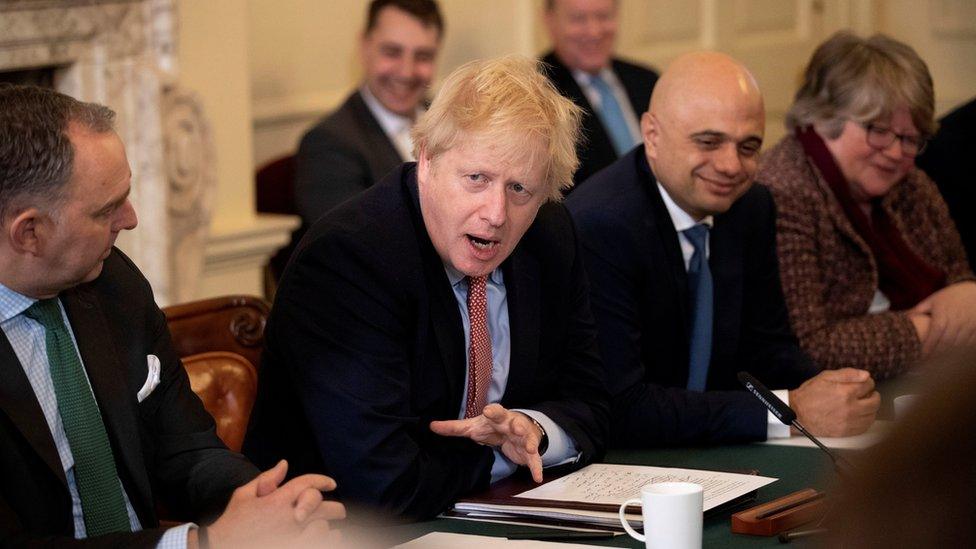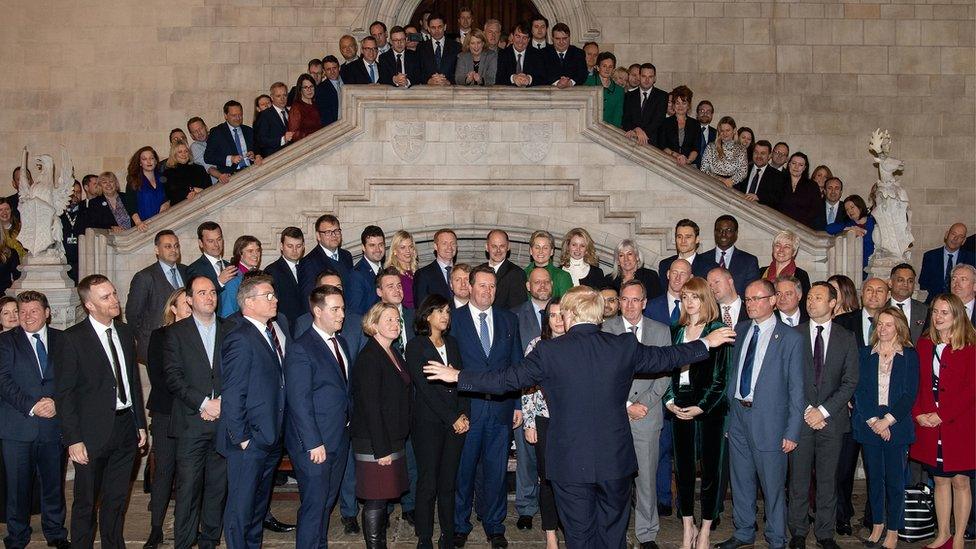A moment of early chest beating over Brexit
- Published

Boris Johnson held the first cabinet of his new government on Tuesday
Surprised that Boris Johnson's new government is raising eyebrows already? Don't be.
The new clause in the Brexit bill might rattle business - and the opposition parties - because it is, in theory, making it more likely that we could exit the EU departure lounge without a full trade deal in place.
Whatever metaphor you want to use, be it a trap door or a new cliff edge, there is outrage already in some quarters of Westminster at the move.
But if you are taken aback, then the last few extraordinary months must have passed you by.
Most straightforwardly, the government, with its new whopping majority, promised in their manifesto that after we leave the EU, the trade talks would be wrapped up in a year and we will have left the transition - the period when we live more or less with the status quo.
The new clause in the bill would put that vow into law (although as ever, until we have seen the bill in black and white it's worth reserving a bit of judgement).
On the basis of the manifesto, Boris Johnson's opponents can hardly argue that they weren't warned. But with a majority of 80 at his back, it's not exactly likely that Parliament would have forced him to extend if he didn't want to.
So this is a political signal, a moment of early chest beating too, designed to disappoint those who might have been hoping No 10 might slide to a softer Brexit over the next few months.
And designed to gratify those who are adamant that Brexit must be completely "done" as soon as possible.
Focus minds
Second of all, Boris Johnson seems to have concluded that if the talks are to go anywhere fast, there has to be a convincing clear deadline.
It was his vow of a Halloween deadline that got him to Downing Street in the first place, and although it was broken in the end, there's little question that his attitude towards extending again and again changed the dynamics of the talks with the EU that got the revised deal done.
Putting the deadline into law may also be designed to focus minds in Brussels. How effective that might be? That's a different question.
But it's worth noting too that getting a trade deal done is not binary. There are potential "patches", as described by Rupert Harrison, George Osborne's former advisor.
He suggests, for example, that a bare bones deal could be done covering goods, with ongoing talks covering other areas.
It may not be as simple as an all singing, all dancing deal, or leaving the transition dramatically and suddenly on World Trade Organisation terms.
Change its mind
Lastly, if the Brexit Bill is passed with this extension block in it, there is nothing, save a sense of potential embarrassment, to stop No 10 passing another law to undo it if they need to later on.
Cynical? Perhaps. But with an 80 seat majority that SW1 is only barely beginning to understand, Downing Street is going to be able to change its mind, miss targets, go back on its word, without there being an immediate cost that puts their position in jeopardy.
That doesn't mean shifting position would be desirable, or that it would be trouble free. But we are now in a different era.
Whether you are delighted or devastated by the result, the new government is insulated from political shocks in a way that none has been since Tony Blair's last general election in 2005.
During the coalition years, David Cameron could rely on a solid majority in Parliament, but only after careful, negotiation with the Lib Dems.
The Conservatives have the chance here to govern in the way they please.

Boris Johnson now has a majority of 80 in Parliament
It's a total contrast to the last last three years, when the Tories have lived permanently on the edge of a government meltdown.
Remember too, this government also includes some people who enjoy goading their opponents - just as they did during the Vote Leave campaign, just as they did in the summer and autumn in No 10, just as they did during the election campaign, and just as they may well do in government.
It will be fascinating to see if, secure in Downing Street, Boris Johnson curbs his and his team's enthusiasm to court controversy.
Even with a hefty majority, there's a limit to the amount of sabre rattling and reform the government machine can handle.
But at least for now, there's plenty of political capital available to be used to follow the pattern of provoke and repeat (then retreat if necessary) while the opposition can only really look on.
And if you're frothing at No 10's plan for the Brexit bill, be warned, as the prime minister told his cabinet this morning, maybe "you ain't seen nothing yet".
